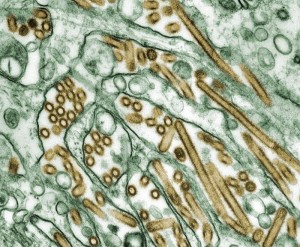CDC advises health providers on H5N1 avian flu in new health advisory
On January 8, 2014, the Public Health Agency of Canada reported the first confirmed case of human infection with avian influenza A (H5N1) virus identified in North America. The patient exhibited symptoms while returning from travel to Beijing, China, on December 27, 2013. For more information on this patient’s travel itinerary, please refer to a Public Health Agency of Canada technical briefing at http://www.phac-aspc.gc.ca/media/nr-rp/2014/2014_0108a-eng.php. The patient was hospitalized on January 1, 2014, and subsequently died on January 3, 2014. Investigations by Canadian public health officials are ongoing. Since avian influenza A (H5N1) viruses have only been rarely, and never sustainably, transmitted from person to person, there is a very low risk of subsequent related cases. To date, no cases of human infection with avian influenza A (H5N1) viruses have been reported in the United States.

H5N1 avian influenza
Image/CDC
This case is a reminder that novel influenza A viruses, including avian influenza A (H5N1) virus, can infect and cause severe respiratory illness in humans. The clinical presentation of human infection with avian influenza A viruses varies considerably. Most reports of H5N1 in humans, however, have described severe illness, including fulminant pneumonia leading to respiratory failure, acute respiratory distress syndrome, and death. Other reported H5N1 complications include encephalitis, septic shock, and multi-organ failure.
Clinicians should consider the possibility of avian influenza A (H5N1) virus infection in persons exhibiting symptoms of severe respiratory illness who have appropriate travel or exposure history. This includes persons with recent travel (within 10 days of illness onset) to areas where human cases of avian influenza A (H5N1) virus infection have been detected or where avian influenza A (H5N1) viruses are known to be circulating in animals1. Rapid detection and characterization of novel influenza A viruses remain critical components of national efforts to prevent further cases, evaluate clinical illness associated with them, and assess any ability for these viruses to spread among humans.
State health departments are encouraged to investigate potential human cases of avian influenza A (H5N1) virus infection as described below and should notify CDC within 24 hours of identifying a probable or confirmed case of novel influenza A virus infection, including avian influenza A (H5N1) virus infection (http://www.cdc.gov/flu/avianflu/h5n1/case-definitions.htm).
Clinicians and state health departments should also be aware that human infection with avian influenza A (H7N9) viruses have been reported among persons in China and Taiwan since April 2013, and may exhibit similar symptoms to those of influenza A (H5N1), including pneumonia, respiratory failure, and acute respiratory distress syndrome. Influenza A (H7N9) infections in humans have also been associated with high mortality. No cases of influenza A (H7N9) infections in humans have been reported in North America. Potential cases of human infection with influenza A (H7N9) virus should also be investigated, using current case definitions and testing recommendations for avian influenza A (H7N9) virus (http://www.cdc.gov/flu/avianflu/healthprofessionals.htm).
Interim Recommendations for Clinicians and State and Local Health Departments
Case Investigation and Testing Recommendations
Patients who meet both the clinical and exposure criteria described below should be tested for avian influenza A (H5N1) virus infection by reverse-transcription polymerase chain reaction (RT-PCR) assay using H5-specific primers and probes. Decisions on diagnostic testing for influenza using RT-PCR should be made using available clinical and epidemiologic information, and additional persons in whom clinicians suspect avian influenza A (H5N1) virus infection also should be tested. For more information on laboratory testing of persons under investigation for avian influenza A (H5N1) virus infection, please see http://www.cdc.gov/flu/avianflu/healthprofessionals.htm. Guidance on testing, treatment, and infection control will be updated by CDC as more information becomes available.














